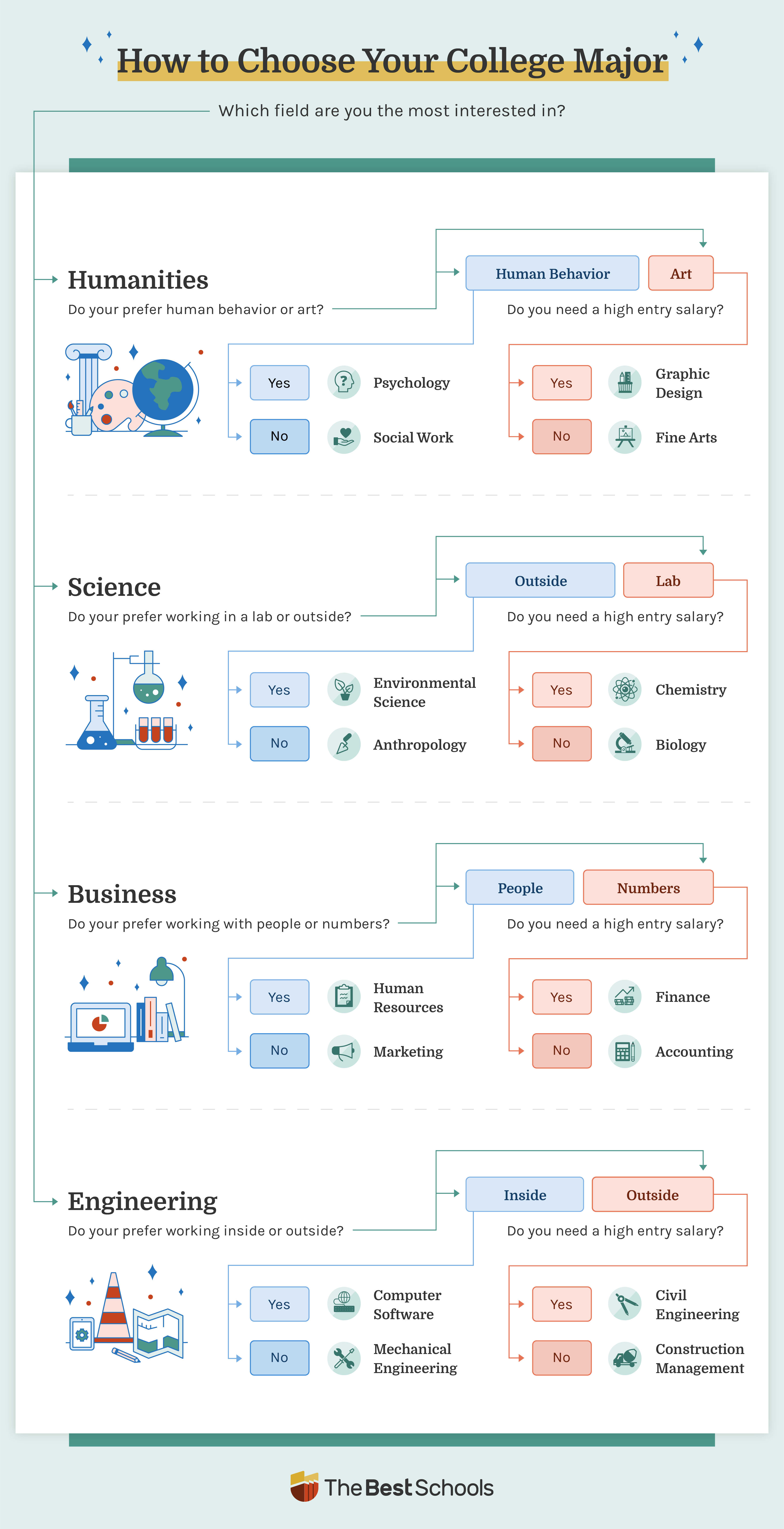How to Choose a College Major
A student’s major can influence their education and career, but choosing the right major takes a lot of consideration. The decision depends on each learner and what they wish to get out of their education.
Some students seek out the highest-paying college majors, while others might seek job security by choosing a high-demand field. As a helpful starting point, this page details some of the most popular college majors, along with expected coursework, potential career pathways, and prospective salaries for each.
Find the Right Major for You
Use our quiz to find the right major for you. Ready to learn more about your chosen degree or find top-ranked programs? Find links below!

Learn More About Your Chosen Major


Art & Design Degree Guide
Best Online Bachelor’s Programs in Art & Design

Anthropology Degree Guide
Best Online Bachelor’s Programs in Anthropology

Chemistry Degree Guide
Best Chemistry Programs in the World Today




Why Is Your College Major Important?
A major plays an important role in a student’s future by focusing their education and preparing them to work in fields within their realm of expertise. As of 2021, nearly 38% of Americans 25 and older have a bachelor’s degree or higher, and selecting the right major can be what separates candidates from their competition. The following sections examine how to choose a college major and explore factors that can help new graduates stand out.
How Does Your College Experience Help You Stand Out?
According to the Bureau of Labor Statistics (BLS), over 80% of workers require on-the-job training, with a median training time of 14 days. But learners can gain the same kind of training and experience through previous employment and internships.
Having work or field experience gives students a powerful competitive advantage when seeking employment. To employers, candidates with both a formal education and a relevant professional background stand out, demonstrating commitment to the discipline. Experience can also cut back on the need for future training and its associated costs and challenges.
Why Is Networking Within Your Major Crucial?
Within their majors, students build the foundations for their eventual careers. This can mean skill-building but also networking. Learners can begin creating their professional support networks and developing relationships that last long after graduation.
Students also have access to professionals who can help them after graduation, including instructors and alumni. Instructors can provide professional recommendations for job applications, and the program’s alumni network can offer potential mentorship opportunities and professional connections.
What Are Your Interests?
For many students, their personal and professional interests provide the best insight on how to choose a college major. Learners who follow their interests may find more job satisfaction and more success in their careers. The following sections outline how students can identify careers that align with their interests.
Where Do You Begin?
Start by considering common academic disciplines, such as business, humanities, or the sciences. Identify what overarching area attracts you most and how your skills may apply. For example, assertive students with strong social skills might aim for business, while critical thinkers who enjoy mathematics and science should consider science, technology, engineering, and mathematics (STEM) majors.
You can narrow the field into specific majors by considering your personal interests. For instance, an aspiring business student interested in human behavior might choose marketing or sales, while a STEM student looking to help others might pursue a healthcare major, like nursing or nutrition science.
What Are the Most Popular College Majors?
Exploring the most popular majors can give you an idea of what your options are. According to the National Center for Education Statistics (NCES), the most popular majors include business, the social sciences, psychology, biological and biomedical sciences, and engineering.
Students with business degrees can pursue careers in nearly any industry, and graduates can apply to roles in some of the country’s largest workforces. Business is also a flexible major, allowing learners to combine disciplines — such as analytics and marketing — to keep things dynamic and exciting.
Healthcare degrees and psychology degrees offer the chance to make a difference by helping others in your community. Both disciplines can also lead to financially rewarding careers, like registered nurse or clinical and counseling psychologist. Psychology majors can also pursue careers in business that rely on maximizing interpersonal relationships, making it a flexible major.
What Are Your Skills?
Prospective enrollees should evaluate their own abilities alongside the skills required in their ideal careers and educational programs. By observing the typical job requirements of possible careers, learners can assess whether a potential career matches their own strengths. They can also identify what skills they still need to develop over time.
Are You More Technical or Expressive?
Whether you operate on an instinctive level or prefer to deal in hard data can affect your career aptitudes. For example, aspiring healthcare professionals with strong technical skills but weak interpersonal skills might not be suited to traditional nursing roles, because nurses often need compassion, emotional stability, and communication skills. Instead, those candidates may find more success as medical scientists or researchers, seeking out medical advancements.
Similarly, a more expressive student interested in a business degree might not see the allure of spreadsheets and profit projections. Rather than choosing a traditional business program with an accounting or finance focus, they should look for business or marketing programs with creative aspects, like graphic design or branding strategy.
What Classes Are Included With the Major?
When choosing a program, consider whether it offers classes in the areas you need most for your desired profession — or where you need the most improvement. Choosing a program that offers courses that complement your existing skill set will help you make the most out of your degree. For example, aspiring graphic designers might want to ensure their potential art programs include coding classes, as graphic design careers often require computer literacy.
Choosing programs with the most useful classes pays off in the long run, though you should also look for intriguing classes that will keep your training interesting and absorbing.
Does Your School Offer the Right Major for You?
In addition to choosing what major to pursue in college, candidates should ensure the quality of that program at the institution they are attending. Not all college programs are created equal; some schools are stronger in particular subjects than others, which can affect students and their careers after graduation. Consider the following questions when deciding on a specific school’s program.
What’s the School’s Reputation for That Major?
Check that the program you are considering comes from an accredited school and carries a strong reputation. Graduating from a respected program can lead to additional employment opportunities and faster career growth. To assess a program’s reputation, consider graduation rates, employment rates, and alumni salaries. This provides a glimpse at your potential return on investment.
You can also evaluate a program’s reputation by exploring its faculty. Reputable teachers not only build students’ skills, but they can also give graduates a competitive professional advantage by writing letters of recommendation. Professors with real-world experience can also enrich a program by integrating their practical knowledge into the curriculum.
Will an Online Degree Offer the Same Quality?
Students should explore all available study options to ensure they choose the one best suited to their goals. That means looking into private and public schools, two- and four-year schools and programs, and online schools and programs, which often offer the same-quality training in a more flexible and accessible package.
Online programs can also allow learners to expand their school search and improve their chances of finding their ideal program because they don’t have to be physically present on campus.
How Important Is Salary to You?
Improving earning potential ranks among the top reasons why students pursue higher education in the first place. When choosing their majors, learners should consider the median annual salaries for the most common career pathways in the fields they’re evaluating.
Does a College Degree Mean a Higher Salary?
Many employers seek out college graduates to fill their more skilled positions, which means professionals with college degrees tend to earn higher wages than those without. According to the BLS, the median annual salary for a college graduate is $64,900 — nearly double the median annual salary for a high school graduate, which is $38,792.
What Are the Highest-Paying College Majors?
High wages can result from several different factors, including education, location, and experience. Every industry has employers that offer above-average wages, but looking at pay rates across the highest-paying college majors helps students understand what the most lucrative fields are. Computer science and information technology majors, for example, end up in some of the highest-paying careers.
The following chart highlights some of the most common and highest-paying college majors available in comparison with the median salary for people with only a high school diploma, which is $38,792.
How Flexible Is Your Degree?
Students may have their sights set on one particular career or employer, but they should anticipate the potential need for future career changes. On average, Americans change jobs every four years, and younger workers change jobs more often than workers who have been in the job market for decades. A flexible skill set and degree can help professionals move between careers with greater ease.
Is Your Major Adaptable?
Choosing an adaptable major helps accommodate the potential for future career changes. For example, a major in communications can lead to careers in publishing, journalism, marketing, public relations, and sales, whereas a literature degree might offer a more limited pathway.
Students can also improve their major’s adaptability through concentrations, research projects, electives, and internships. Diversifying your resume while in college can open a lot of career doors after graduation.
Is Your Major Locale-Specific?
Students need to consider many things when choosing a major, and location is an important but often overlooked factor. Many industries and professions are more prominent in certain locations. For example, cities and metropolitan centers typically have a variety of technology careers, while rural areas have fewer opportunities in tech.
Location can also affect wages and employment requirements. Big cities usually offer higher wages than rural areas do. Those who wish to live in small towns should keep this in mind.
Can You Change Your Major?
Students often find the process of choosing a major challenging. According to an Ellucian survey, two-thirds of students feel overwhelmed by the process, and only 52% of Gen Z enrollees are confident in their choices. Thankfully, learners can make adjustments as they learn, grow, and gain experience. The following sections explore when and how to change your major.
When to Change Your College Major
While learners can technically change their majors at any time, they should aim to have it decided between years one and two of their studies. Since most programs begin with a heavy focus on general education credits, students can change majors at this point without losing credits, time, and money.
It is not uncommon to change majors later, but it can mean taking more credits, paying more in tuition, or even graduating later.
How to Change Your College Major
An individual considering changing their major should start by speaking with an academic advisor. These experts can provide helpful information and examine how the change may affect the student’s transfer credits, tuition rate, and graduation date.
Before making any decision, learners should apply the questions on this page to their new major to determine if the change is right for them.
Should I Choose a Minor, Too?
Choosing a minor isn’t as stressful as choosing a major because there isn’t as much pressure, but it can still have a significant impact on your education. A minor can complement or fine-tune a student’s focus, or it can help them flesh out their education with a topic of interest. However, a minor can also add time and increase costs, so learners should carefully consider how a minor affects their education timeline.
Why You Should Get a Minor
Students can use a minor to develop a training emphasis, which leads to better career opportunities. For example, learners who major in business may choose to minor in marketing or accounting. This additional training can improve the student’s skills, expand their resume, and raise their chances of finding employment in the niche field that interests them.
Why You Shouldn’t Get a Minor
Earning a minor can provide advantages, but not all students need them. Learners with unclear career goals, for example, may not find value in a minor. Additionally, those who have full schedules or are experiencing academic difficulties should avoid adding more responsibilities.
It’s also important to consider how a minor might affect your graduation date and tuition costs before making a decision.
Conclusion
Picking the right major can make a huge difference in your education and career. You should take your time making the decision, looking at all your options and weighing the pros and cons of each. Asking the right questions and examining your skills and interests can help you find the perfect major and start your professional journey on the right foot.









